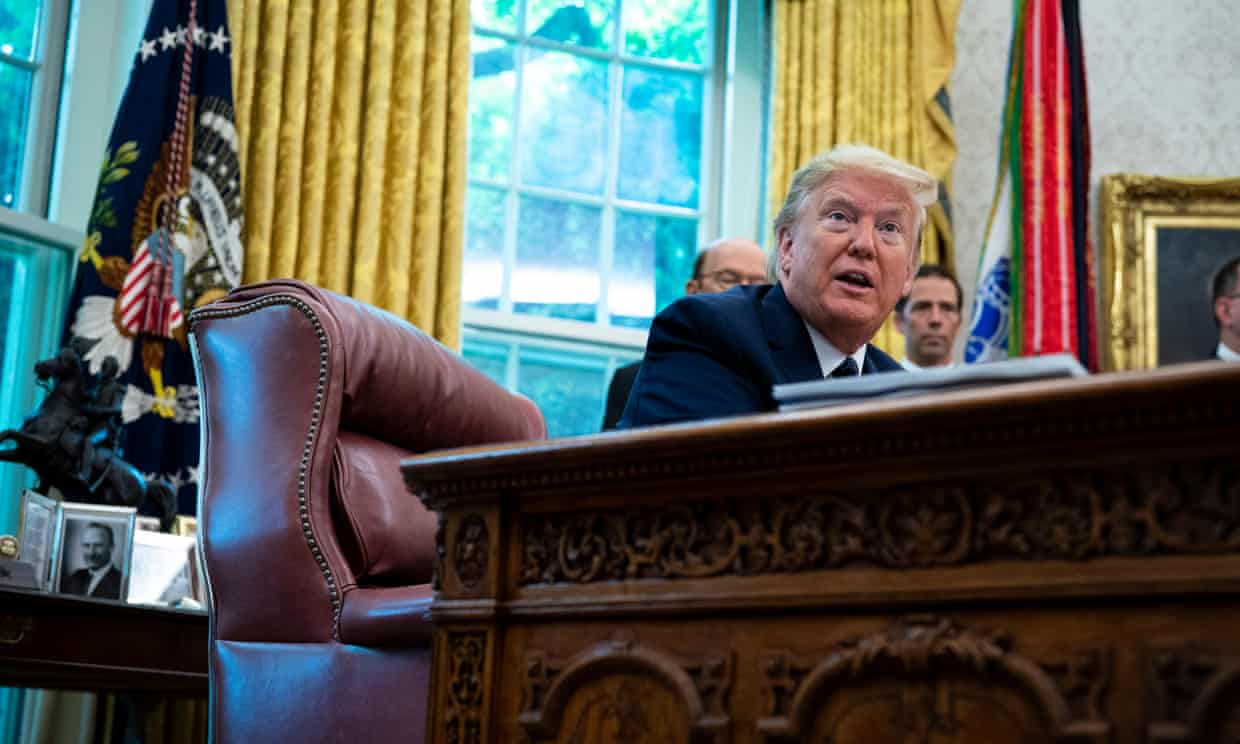
Donald Trump
Trump signs executive order to narrow protections for social media platforms
Move comes amid president’s feud with Twitter after it factchecked him for the first time
by David SmithDonald Trump has fired a shot across the bows of “big tech” companies by signing an executive order that aims to narrow their protections from liability over the content posted on their services.
The move came as the US president stepped up his attacks against social media giants after Twitter factchecked him for the first time over a false assertion that mail-in voting leads to widespread voter fraud.
However, critics said it was the president’s latest effort to spur controversy and create a distraction as the country passed the grim milestone of 101,000 deaths from Covid-19. The Trump administration has faced widespread accusations that it has mishandled the crisis.
“Currently, social media giants like Twitter receive an unprecedented liability shield based on the theory that they are a neutral platform, which they are not,” the US president said in the Oval Office on Thursday. “We are fed up with it. It is unfair, and it’s been very unfair.”
Under Section 230 of the Communications Decency Act, tech companies currently enjoy broad immunity from civil lawsuits stemming from what users post because they are treated as “platforms” rather than “publishers”.
Trump’s executive order is designed to pressure regulators, including the Federal Communications Commission and the Federal Trade Commission, to come up with new rules that would curtail that immunity. It is likely to face legal challenges.
As he prepared to sign the order, the president added: “They’ve had unchecked power to censor, restrict, edit, shape, hide, alter virtually any form of communication between private citizens or large public audiences.
“There is no precedent in American history for so small a number of corporations to control so large a sphere of human interaction.”
Twitter responded by calling the executive order a “reactionary and politicized approach to a landmark law” .
“#Section230 protects American innovation and freedom of expression, and it’s underpinned by democratic values,” the company said in a tweet. “Attempts to unilaterally erode it threaten the future of online speech and internet freedoms.
The move was welcomed by observers who argue that Facebook and Twitter should be held responsible for their content and subject to the same laws as the New York Times and other mainstream outlets.
But many in the business and technology sectors argue the order could curb freedom of speech on the internet and it conflicts with existing law – which only Congress, not the president – can change.
Matt Schruers, the president of the Computer and Communications Industry Association, told the Associated Press: “The irony that is lost here is that if these protections were to go away social media services would be far more aggressive in moderating content and terminating accounts. Our vibrant public sphere of discussion would devolve into nothing more than preapproved soundbites.”
Gary Shapiro, the president and chief executive of the Consumer Technology Association, said: “We oppose today’s unconstitutional, ill-considered executive order. The free speech protections in Section 230 of the Communications Decency Act are the legal underpinning of our vibrant US online economy and our nation’s global digital leadership.
“America’s internet companies lead the world and it is incredible that our own political leaders would seek to censor them for political purposes. These same politicians extensively advertise on them and just a few minutes online will reveal these platforms contain a multitude of political views.
“Section 230 protects these companies as well as any start-up website which hosts others’ speech – from community bulletin boards to social media sites to the Fox News comments section.”
The US Chamber of Commerce said in a statement: “We believe that free speech and the right to engage in commerce are foundational to the American free enterprise system.
“Regardless of the circumstances that led up to this, this is not how public policy is made in the United States. An executive order cannot be properly used to change federal law.”
Many sceptics regard Trump’s action as politically motivated ahead of the November election. He and other conservatives have long accused social media companies of liberal or pro-China bias, even as Twitter has this week allowed the president to tweet baseless conspiracy theories accusing a TV host of murder.
Ted Cruz, a Republican senator from Texas, said “big tech” can no longer go unchecked. “For too long, social media platforms like Twitter have hid behind their opaque algorithms and Section 230 immunity to target speech with which they disagree and advance their own political agendas,” he added.
“This doesn’t just stifle Americans’ free speech; it shapes what Americans see, hear and ultimately think about the major issues facing our country, including how those issues should be addressed and who should be elected to address them.”
Brad Parscale, the Trump 2020 campaign manager, said on Thursday: “Social media has been allowed to operate unchecked for years while enjoying the protection of federal law.
“These Silicon Valley giants have set themselves up as the arbiters of truth, censoring or labeling posts they disagree with, but they have shown that they cannot be trusted to be honest and fair. We have known for a long time that social media companies have it in for conservatives in general and President Trump specifically.”
But, critics say, after Twitter’s intervention on Trump’s false claims about mail-in voting, the company merely became the latest convenient punchbag for him to cultivate victimhood, rile up his base – and deflect attention from the coronavirus pandemic death toll.
Ron Wyden, a Democratic senator from Oregon, warned: “Donald Trump’s order is plainly illegal. After driving our country into an economic and healthcare disaster, Trump is desperately trying to steal for himself the power of the courts and Congress to rewrite decades of settled law around Section 230. All for the ability to spread unfiltered lies.”